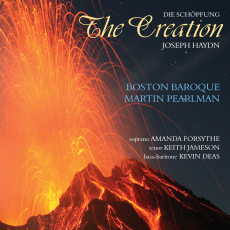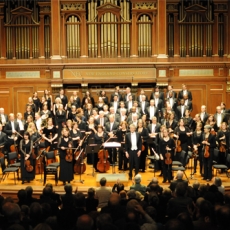Boston Baroque - Haydn Creation - Audiophile Audition
Haydn's 1798 blockbuster The Creation blew away most of musical Europe; the work was so popular that it was performed over 40 times in Vienna alone during Haydn's lifetime. Its two-year gestation exhausted the composer, who fell ill at the end of it, and who also claimed that it was the most spiritual work he had ever involved himself with. The formal inspiration came of course from the oratorios of Handel that he had heard while in London, performed with very large forces. This last point is one which you might think more authentic instrument groups would take to heart, but as of yet only one or two have heeded, the call, preeminently the DGG recording of Paul McCreesh.
The libretto, by Mozart supporter Baron van Swieten, ended up in his hands after a long process which started with the books of Genesis, Psalms, and John Milton's Paradise Lost. By the time Swieten got it several others had already worked on it, though the original writer remains unknown. Swieten cast it into the German now known and which Haydn carefully set the texts-more naturally than the English-though the composer himself preferred that the English be used in front of English audiences, and the work was published bi-lingual. After the enormous first reception, the text came under some critical scrutiny, and the music itself was largely ignored at the end of the nineteenth century. In 1949 the Haydn society produced the first recording, and the work reassumed its place in the pantheon of great oratorios, undiminished until this day.
Pearlman's 40-member orchestra and 25-count chorus are a long way from Haydn's initial 120 orchestra members and 60 member choir. McCreesh was much closer in his non-Super Audio recording on DGG, a spectacular rendition that suffers only from DGG's abandonment of high-end audio. Pearlman and company suffer from no such negativity in their ditching once-audiophile-friendly Telarc for genuinely-audiophile-friendly Linn Records, and the results are spectacular. If only they had gone the way of McCreesh and even Rene Jacobs on his recent CD set that also uses large forces -then we would have had something fantastic to write home about. Instead we do get some "minor" authenticity in that these forces were indeed employed by Haydn in one of his performances, though history shows that he would not have considered them optimal. But also absent are some of the more maniacal tempos that Pearlman likes to indulge in, though he still fills out the discs ten minutes faster than McCreesh, also infamous for some of his tempos as well. Soloists are very fine and the choral work superb. Recommended!

